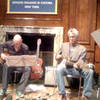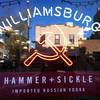“O’ Giglio e Paradiso”: An Italian-American Musical Classic
What the Brooklyn giglio feast and an obscure musician might tell us about Italian-American culture.
Today is the opening of the annual Brooklyn giglio feast in honor of the fifth century bishop St. Paulinus of Nola (Naples province, Campania), introduced by Nolani immigrants to the United States in 1903. The contemporary Williamsburg festa features approximately 125 men lifting and carrying a multi-storied tapering spire, known as the giglio (lily), or, more accurately, u’ gigl’, consisting of a painted papier-mâché façade attached to an aluminum frame. The feast’s dramatic climax is the meeting of the tower and a second ceremonial structure—a boat, complete with mast, sail, and rigging—at the intersection of Havemeyer and North 8th Streets in an enacted evocation of a mytho-historic moment when the jubilant townspeople welcomed home their manumitted bishop by waving lilies.
Trumpeter Phil Caccavalle and clarinetist Antonio Rosalia (1895-1970) composed the music in 1957, and Pasquale Ferrara wrote the Neapolitan lyrics the following year. The new song made its début in 1959. Up until that point, a new feast song was composed annually, in keeping with the tradition introduced by immigrants in 1903. Inventing a new tradition of a single, familiar song played from year to year occurred as the neighborhood was experiencing a series of dramatic changes (see my article for more on this topic).
Related Links:







































i-Italy
Facebook
Google+
This work may not be reproduced, in whole or in part, without prior written permission.
Questo lavoro non può essere riprodotto, in tutto o in parte, senza permesso scritto.